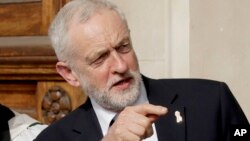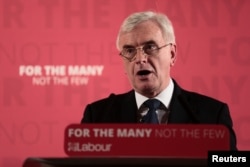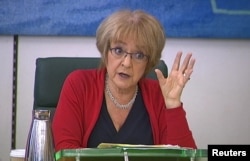Britain's opposition leader, Jeremy Corbyn, is under increasing pressure to expel far-left allies from his party in a worsening quarrel over anti-Semitism that's shaking up British politics and damaging the Labour Party's electoral prospects. One of his party allies has accused Jewish critics, including some Labour lawmakers, of being "Trump fanatics."
A senior Labour lawmaker, John McDonnell, acknowledged this week that the long-running and bruising argument, with repeated clashes spanning several months between Jewish Labour lawmakers and Corbyn and his hard-core supporters, has "shaken us to the core."
McDonnell was speaking after Corbyn apologized for a 2010 event he hosted, where a Holocaust survivor compared Israeli policy toward the Palestinians to the actions of Germany's Nazi regime. Corbyn, who is seen as the most far left leader the party has had since the 1930s, said he "completely rejects" the views of some people he had shared platforms with in the past.
"In the past, in pursuit of justice for the Palestinian people and peace in Israel-Palestine, I have on occasion appeared on platforms with people whose views I completely reject," Corbyn said in a statement. "I apologize for the concerns and anxiety that this has caused."
But his critics say he has failed to denounce his historical support for Hamas and Hezbollah. He has spoken sympathetically of both groups in the past, embracing them as brothers. This includes Hamas operative Abdul Aziz Umar, who was given seven life sentences for aiding the preparation of a 2003 suicide bombing of a restaurant in Jerusalem that left seven dead.
Unsettling pattern
Accusations of anti-Semitism have mounted since 2015 when Corbyn won a surprise leadership contest largely thanks to backing from a well-organized Trotskyite youth group known as Momentum. The anti-Semitism dispute has settled into a grim pattern with frequent, ugly flare-ups and then pauses as the warring sides have sought accommodation.
Corbyn backers say their critics conflate criticism of Israel with anti-Semitism. But their critics say their opposition to Israel and anti-Zionism bleeds all too easily into anti-Semitism. Britain's Board of Deputies, an elected representative body of Britain's Jewish community, has denounced "Jeremy Corbyn's failure to take strong action against" anti-Semitism.
Earlier this year the outgoing president of the Board of Deputies, Jonathan Arkush, accused the Labour leader of holding "anti-Semitic views," which could drive Jewish people to leave Britain if he ever becomes prime minister. "Delegitimizing the state of Israel is anti-Semitic," he said.
The latest clash was triggered this month when the Labour leadership failed to adopt, as it had appeared to promise to do following talks with British Jews, a new code of conduct on anti-Semitism based on the guidelines of International Holocaust Remembrance Alliance, which is backed by 31 countries. The mainly Europe-based alliance was set up in 1998 to counter Holocaust denial and trivialization.
Heated confrontations
Last week, Britain's three main Jewish newspapers published the same front page, warning that a government led by Corbyn would represent an "existential threat to Jewish life." They say there are seams of anti-Semitism within the ranks of the party and have reported regularly on the social media slurs hurled by far-left rank-and-file members at Jewish Labour lawmakers.
Jewish Labour lawmakers say the truncated code of conduct the Labour leadership adopted is not as comprehensive as the international guidelines, and it prompted a party stalwart and Labour lawmaker, Margaret Hodge, to confront Corbyn very publicly in the House of Commons, where she accused him loudly of being a racist and an anti-Semite. She denied reports she had sworn at him.
Hodge is now facing disciplinary proceedings — in marked contrast, say her supporters, to the more lenient and foot-dragging treatment of party members, especially those in the Momentum group, who are accused of expressing anti-Semitic remarks.
Speaking on BBC Radio Thursday, Hodge said British Jews "feel our identity and our values are being challenged by this sudden surge in anti-Semitism, which is not only allowed by the leadership, but I've now come to the conclusion that may also be views held by the leadership themselves."
Britain's ruling Conservatives and the tabloid newspapers, who have questioned the firebrand Labour leader's fitness for office, have pounced on the anti-Semitism claims, which have been front page news in London for several days.
Rise of populism
In 2016, Corbyn ordered an independent inquiry into anti-Semitism and other forms of racism in the Labour Party. That came after the party suspended a lawmaker, Naz Shah, and the former Mayor of London, Ken Livingstone, for anti-Semitic remarks. Shah was suspended over historical social media posts, including one suggesting Israel should be moved to the United States. After being reinstated, she admitted her comments had been anti-Semitic and were made in ignorance.
The inquiry concluded that while the Labour Party was not overrun by anti-Semitism, there was an "occasionally toxic atmosphere." It made a series of recommendations, many of which have not been implemented. Jewish lawmakers say the inquiry's conclusions were not strong enough, that the toxic atmosphere is constant and not just occasional, and that it is ingrained, pointing to the slurs aimed at them on social media.
The party has suspended dozens of local members for anti-Semitism. Among them is Damien Enticott, who trumpeted the view that "Hitler would have the solution to the Israeli problem."
Historically, Labour has enjoyed strong electoral support from Britain's 300,000-member Jewish community. Their vote is especially important for the party in London.
Britain isn't the only European country facing what Jewish leaders say is an upsurge in anti-Jewish sentiment, as well as Holocaust denial — the result, they say, of the rise in far-right and far-left populism.


